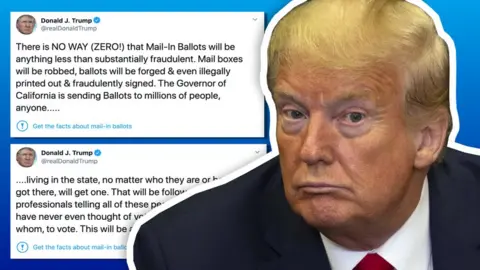Trump signs executive order targeting Twitter after fact-checking row
 AFP
AFPUS President Donald Trump has signed an executive order aimed at removing some of the legal protections given to social media platforms.
He said the firms had "unchecked power" to censure and edit the views of users.
President Trump has regularly accused platforms such as Twitter and Facebook of stifling conservative voices.
The order, which is expected to face legal challenges, comes after Twitter decided to append fact-check labels to two of his tweets this week.
On Wednesday Mr Trump accused the company of election interference after it added a warning label to the tweets about claims of widespread fraud in mail-in voting - also known as postal votes.
Twitter and other social media platforms strongly condemned the executive order.
And early on Friday, Twitter hid one of President Trump's tweets from his profile, saying it violates rules about glorifying violence.
What does the executive order say?
Under a 1996 law, website operators, unlike traditional publishers, cannot generally be held responsible for content posted by users.
The sites are also protected from lawsuits if they block posts deemed obscene, violent "or otherwise objectionable, whether or not such material is constitutionally protected".
The executive order argues that this immunity should no longer apply if a social network edits posts, such as by adding a warning or a label.
It also says "deceptive" blocking, including removing a post for reasons other than those described in a website's terms of service, should not be protected.
Republican Senator Marco Rubio is among those arguing that the platforms take on the role of a "publisher" when they add fact-check labels to posts.
"The law still protects social media companies like Twitter because they are considered forums not publishers," Mr Rubio said.
"But if they have now decided to exercise an editorial role like a publisher, then they should no longer be shielded from liability."
The executive order also calls for the Federal Communications Commission (FCC) to spell out what type of content blocking will be considered deceptive or inconsistent with a service provider's terms and conditions.

What effect will the order have?

Donald Trump promised "big action" in response to Twitter's decision to append a fact-check message to two of his posts. While his announcement of an executive order was heavy on rhetoric - accusing social media companies of being monopolies that threaten free speech - it will be a long process before the talk turns into real action, big or otherwise.
Independent government agencies will have to review federal law, promulgate new regulations, vote on them and then - in all likelihood - defend them in court. By the time it's all over, the November presidential election could have come and gone.
That explains why Trump is also pushing for new congressional legislation - a more straightforward way of changing US policy toward social media companies.
The real purpose of the president's order, however, may be symbolic. At the very least, the move will cause Twitter to think twice about attempting to moderate or fact-check his posts on their service.
The president relies on Twitter to get his message out without filtering from the mainstream media. If Twitter itself start blunting one of his favourite communication tools, he is sending a message that he will push back - and make things, at a minimum, uncomfortable for the company.

How have the social networks responded?
Twitter called the order "a reactionary and politicized approach to a landmark law," adding that Section 230 "protects American innovation and freedom of expression, and it's underpinned by democratic values".
Google, which owns YouTube, said changing Section 230 would "hurt America's economy and its global leadership on internet freedom."
"Our platforms have empowered a wide range of people and organizations from across the political spectrum, giving them a voice and new ways to reach their audiences," the firm said in a statement to the BBC.
In an interview with Fox News on Wednesday, Facebook's chief executive, Mark Zuckerberg, said censoring a social media platform would not be the "right reflex" for a government concerned about censorship.
"I just believe strongly that Facebook shouldn't be the arbiter of truth of everything that people say online," said Mr Zuckerberg.
What sparked the latest row?
The long-running dispute between Mr Trump and social media companies flared up again on Tuesday, when two of his posts were given a fact-check label by Twitter for the first time.
He had tweeted, without providing evidence: "There is no way (zero) that mail-in ballots will be anything less than substantially fraudulent."
Twitter added a warning label to the post and linked to a page describing the claims as "unsubstantiated".
Then on Wednesday, Mr Trump threatened to "strongly regulate" social-media platforms.
He tweeted to his more than 80 million followers that Republicans felt the platforms "totally silence conservatives", and that he would not allow this to happen.
In an earlier tweet, he said Twitter was "completely stifling free speech".
Twitter's chief executive, Jack Dorsey, responded to criticism of the platform's fact-checking policies in a series of posts, saying: "We'll continue to point out incorrect or disputed information about elections globally."
Allow X content?

Twitter has tightened its policies in recent years, as it faced criticism that its hands-off approach allowed fake accounts and misinformation to thrive.
